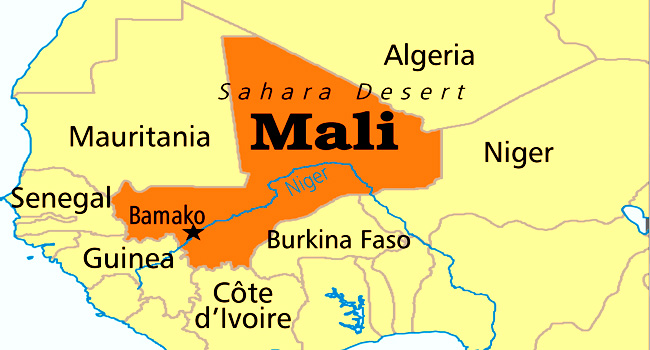At least 100 of Boko Haram guerrillas on Monday seized control of the town of Gao in Northern Mali, news agencies reportedly quoted Abu Sidibe, a Local Deputy Governor in the country to have said.

“There are a good 100 Boko Haram fighters in Gao. They are Nigerians and from Niger,” Mr Sidibe was quoted to have said.
“They’re not hiding. Some are even able to speak in the local tongue, explaining that they are Boko Haram,” he added.
The news was confirmed also by the Bamako security forces.
Militants from Boko Haram “were in a majority among those who attacked the Algerian consulate” in Gao on Thursday, a Malian security official said, adding that “they had black skin”.
Seven Algerian diplomats, including the consul, were taken hostage at the time.
Mali has been grappling with a separatist uprising in the north. It intensified after the coup by army officers on 22 March.
Seven people were killed today, including a girl of seven, in a new wave of attacks launched by the Boko Haram Islamic group.
In Dikwa, Yobe state, the terrorists killed a policeman, a civilian and a local politician during the night, as made known by the Nigerian army.
They attacked a police station, a bank, and a hotel but was forced back by the soldiers, as lieutenant-colonel Sagir Musa, the Joint Task Force of the Borno State spokesperson announced.
Three of the guerillas were killed, the others, though injured, managed to run away.
Here are some facts about Boko Haram
THE GROUP
* Boko Haram became active in about 2003 and is concentrated mainly in the northern Nigerian states of Yobe, Kano, Bauchi, Borno and Kaduna.
* Boko Haram, which in the Hausa language of northern Nigeria means “Western education is sinful,” is loosely modelled on the Taliban movement in Afghanistan.
* The group considers all who do not follow its strict ideology as infidels, whether they be Christian or Muslim. It demands the adoption of sharia, or Islamic law, across Nigeria.
* Boko Haram followers have prayed in their own mosques in cities including Maiduguri, Kano and Sokoto, and wear long beards and red or black headscarves.
* The group published an ultimatum in January 2012 giving Christians three days to leave northern Nigeria. Since then, attacks in northeastern Nigeria have killed many and hundreds of Christians have fled to the south. President Goodluck Jonathan declared a state of emergency on Dec. 31 in an effort to contain the violence.
* Human Rights Watch said in January that the sect had killed at least 935 people since 2009.
* Jonathan said the violent sect had supporters within his own government and the insecurity the group had created was worse than during the civil war that broke out in 1967 and killed more than a million people.
* In a recent success, Nigeria arrested the purported spokesman for Boko Haram on Feb. 1, known as Abu Qaqa.
* Abu Qaqa, a shadowy figure and purported spokesman for Boko Haram said on March 20 it had “closed all possible doors of negotiation” with a government of “unbelievers” that it cannot trust, and called on Muslims to join the fight against it.
MAJOR ATTACKS BY BOKO HARAM:
* In its first attack in Jan. 2004, it attacked a town in Yobe State before being forced to withdraw by security forces.
* In July 2009, Boko Haram staged attacks in the northeastern city of Bauchi after the arrest of some of its members, and clashed with police and the army in Maiduguri. About 800 people were killed in five days of fighting in the two cities. Later that month, sect leader Mohammed Yusuf was captured by Nigerian security forces and shot dead in police detention hours later.
* In early July 2010, Abubakar Shekau, a former deputy leader of the sect who was thought to have been killed by police in 2009, appeared in a video and claimed leadership.
* On Aug. 26, 2011 a suicide bomber struck the U.N. building in Abuja. At least 23 people were killed and 76 wounded. Boko Haram claimed responsibility on Aug. 29, demanding the release of prisoners and an end to a security crackdown aimed at preventing more bombings. It was the first known suicide bombing in Nigeria.
* An attack on St. Theresa’s Catholic church in Madalla on Abuja’s outskirts during a packed Christmas mass, was the deadliest of a series of Christmas attacks on Nigerian churches and other targets by the sect. At least 37 people were killed.
* On Jan. 20, 2012 coordinated bomb and gun attacks on security forces in the northern city of Kano killed at least 186 people in the group’s most deadly attack.
* On Feb. 26 a suicide bomber drove a car packed with explosives into a church in Jos, killing two people. Reprisals soon followed and Christian youths killed at least 10 people in Jos days later.
* On Easter Sunday a bomber tried to drive a car packed with explosives into a church compound in northern Kaduna during an Easter Sunday service. However the car was stopped and the driver turned back. The bomb exploded by a large group of motorbike taxi riders, the police and witnesses said. At least 36 people were killed and 13 critically injured.




